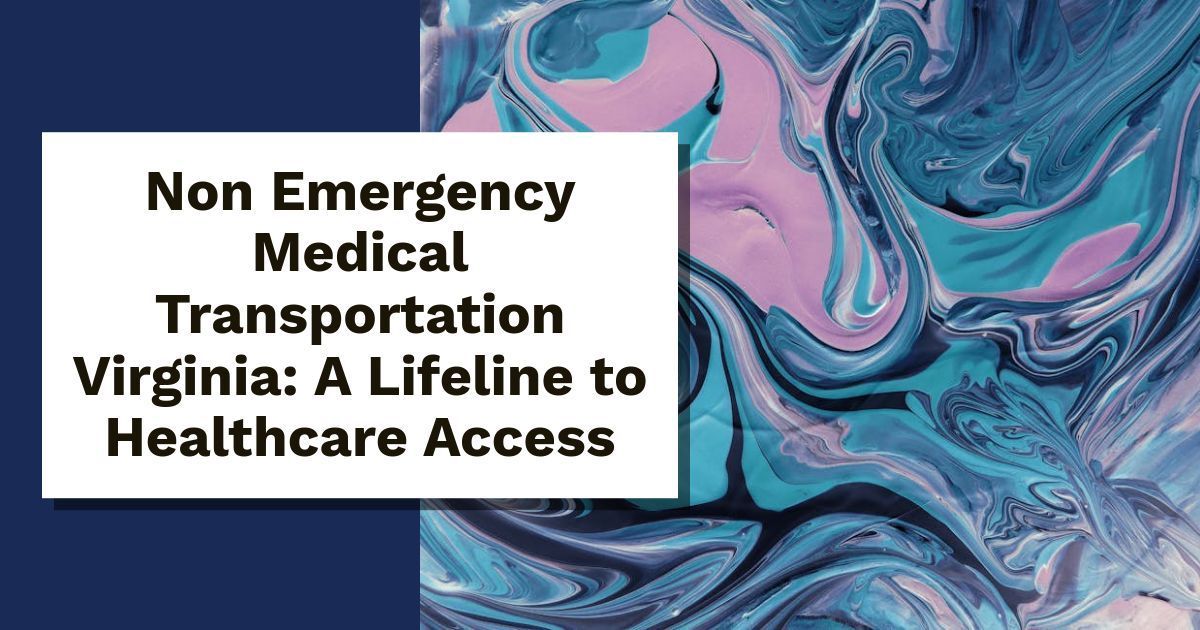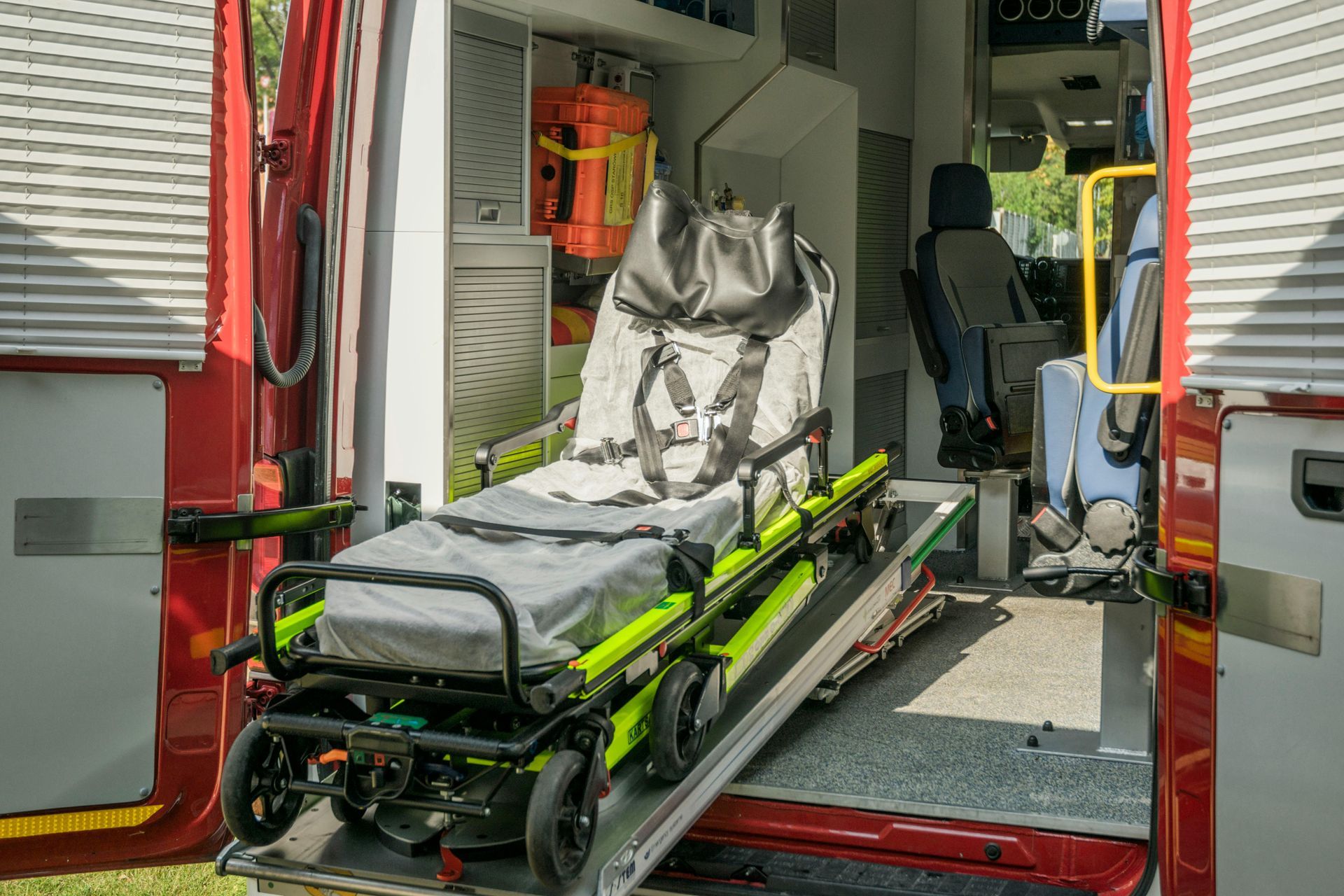Patients Are Missing Their Appointments Because of Unreliable Medical Transportation
In the realm of healthcare, reliable medical transportation in Virginia is often the unsung hero that ensures patients can access vital medical appointments and services. However, the unfortunate reality is that many individuals face the distressing challenge of unreliable medical transportation, leading to missed appointments and potential setbacks in their healthcare journey. This issue not only affects patients but also poses significant challenges for healthcare providers striving to deliver timely and effective care to those in need.

Unreliable Medical Transportation
Leading to Missed Appointments for Patients
In today's fast-paced world, one of the key challenges faced by healthcare providers is ensuring that patients have reliable transportation to attend their medical appointments. Lack of accessible and dependable transportation options can result in missed appointments, delayed treatments, and overall disruptions in the healthcare system. This article aims to shed light on the importance of reliable medical transportation and explore potential solutions to address this issue.
The Impact of Unreliable Medical Transportation
1. Missed Appointments and Delayed Treatments
One of the most significant consequences of unreliable medical transportation is the high number of missed appointments, which can have detrimental effects on patients' health outcomes. When patients are unable to attend their appointments, it hinders the timely diagnosis and treatment of their medical conditions. This can result in delayed interventions, progression of diseases, and increased healthcare costs in the long run.
To further illustrate the impact of missed appointments and delayed treatments, consider the following:
- Patients with chronic conditions, such as diabetes or hypertension, require regular check-ups and treatments to manage their conditions effectively. Without reliable transportation, they may miss these crucial appointments, leading to uncontrolled symptoms and potential complications.
- For individuals undergoing cancer treatment, timely follow-up visits are essential to monitor their progress and adjust treatment plans accordingly. Failure to attend these appointments due to unreliable transportation can have severe consequences, including disease progression and reduced chances of successful outcomes.
- Mental health patients in need of therapy or counseling sessions may find it challenging to access these services consistently if transportation is unreliable. This can hinder their progress and recovery, further exacerbating their condition.
2. Increased Emergency Room Utilization
Lack of reliable transportation options often forces patients to resort to emergency rooms for non-emergency medical needs. This not only strains emergency departments but also increases healthcare costs for both patients and providers. By addressing the issue of unreliable medical transportation, we can alleviate the burden on emergency rooms and improve overall healthcare efficiency.
Consider the following points to understand how unreliable medical transportation contributes to increased emergency room utilization:
- Patients who miss their scheduled appointments due to transportation issues may postpone necessary medical care until their conditions worsen. As a result, they may eventually require emergency room visits instead of receiving timely preventive or primary care.
- Without access to reliable transportation, patients who require regular treatments, such as dialysis or chemotherapy, may face difficulties in attending their sessions. This can lead to medical emergencies that could have been prevented with consistent and reliable transportation.
- For individuals with chronic pain or conditions that require immediate attention, the lack of reliable transportation can force them to rely on emergency room visits as a last resort. This not only strains emergency departments but also leads to increased wait times for patients with genuine emergencies.
3. Disparities in Access to Healthcare
Unreliable medical transportation disproportionately affects vulnerable populations, including low-income individuals, elderly patients, and those living in rural areas. These individuals may lack access to private vehicles or face limited public transportation options, making it challenging to reach healthcare facilities. Consequently, disparities in access to healthcare services continue to widen, exacerbating existing health inequalities.
To grasp the full extent of disparities in access to healthcare caused by unreliable medical transportation, consider the following factors:
- Low-income individuals may struggle to afford private transportation or rely on public transportation systems that may not adequately cater to their medical needs. This lack of reliable transportation options can prevent them from accessing essential healthcare services, leading to poorer health outcomes and perpetuating the cycle of poverty.
- Elderly patients, especially those with mobility challenges or chronic conditions, often face difficulties in accessing transportation services that accommodate their specific needs. This can significantly limit their ability to attend medical appointments, resulting in delayed diagnoses and treatments.
- Individuals living in rural areas may have limited transportation options, with long distances and lack of public transportation infrastructure making it challenging to reach healthcare facilities. This geographical barrier further exacerbates healthcare disparities, as these individuals may struggle to access specialized care available only in urban centers.
Solutions to Improve Medical Transportation Reliability
1. Partnership with Transportation Services
Healthcare organizations can collaborate with local transportation services to provide reliable transport options for patients. By establishing partnerships, healthcare providers can ensure that patients have access to transportation specifically tailored to their medical needs. This can include specialized vehicles equipped with necessary medical equipment and trained drivers to assist patients with mobility challenges.
Partnerships with transportation services can bring about the following benefits:
- Dedicated vehicles equipped with medical equipment, such as stretchers, wheelchair, or oxygen supplies, can cater to patients with specific medical needs, ensuring their safety and comfort during transportation.
- Trained drivers familiar with the needs of patients with disabilities or limited mobility can provide appropriate assistance, such as wheelchair accessibility and patient lifting, ensuring a smooth and efficient transportation experience.
- By collaborating with transportation services, healthcare organizations can establish reliable scheduling systems that prioritize medical appointments, reducing the likelihood of missed appointments and delays.
2. Telehealth and Virtual Consultations
Incorporating telehealth and virtual consultation services can significantly reduce the reliance on physical transportation. With advancements in technology, healthcare providers can offer remote consultations, minimizing the need for patients to travel long distances for routine check-ups or follow-ups. This not only enhances convenience for patients but also reduces the burden on transportation resources.
The adoption of telehealth and virtual consultations can yield the following advantages:
- Patients can receive medical advice, prescriptions, and follow-up care from the comfort of their homes, eliminating the need for transportation to healthcare facilities unless absolutely necessary.
- Remote consultations can be particularly beneficial for individuals with mobility challenges, chronic conditions, or mental health concerns, who may find it difficult or inconvenient to travel for in-person appointments.
- Telehealth can also enable healthcare providers to reach patients in remote or underserved areas, bridging the geographical gap and ensuring access to specialized care that may not be available locally.
3. Non-Emergency Medical Transportation Programs
Implementing non-emergency medical transportation providers can be instrumental in ensuring reliable transportation for patients. These programs can be subsidized by healthcare organizations, government agencies, or community initiativ
es to provide affordable and accessible transport options for individuals who lack reliable transportation means. By coordinating with local transportation providers, these programs can effectively bridge the transportation gap for patients.
Non-emergency medical transportation programs offer the following advantages:
- Subsidized transportation services can significantly reduce financial barriers for patients who cannot afford private transportation or face high costs associated with public transportation options.
- By coordinating with local transportation providers, these programs can ensure that patients have access to reliable transportation at scheduled times, minimizing the risk of missed appointments and treatment delays.
- Integrated systems that connect healthcare providers, transportation services, and patients can streamline the scheduling and coordination process, optimizing the use of transportation resources and improving overall efficiency.
4. Patient Education and Support
Educating patients about available transportation resources and providing assistance in navigating transportation options can help mitigate the impact of unreliable medical transportation. Healthcare providers can engage in meaningful conversations with patients, addressing their transportation concerns, and providing information on local services or programs available to them. Additionally, offering support in scheduling appointments and arranging transportation can further empower patients to overcome transportation barriers.
Patient education and support initiatives can yield the following outcomes:
- Increased awareness among patients about available transportation resources, such as medical transportations, stretcher services, or community-based transportation programs, can empower them to make informed decisions and explore different options.
- Clear communication from healthcare providers regarding the importance of attending appointments and the potential consequences of missed appointments can motivate patients to prioritize reliable transportation and seek assistance when needed.
- By providing personalized assistance in scheduling appointments and arranging transportation, healthcare staff can alleviate the burden on patients and facilitate their access to reliable transportation options.
Conclusion
By recognizing the significance of reliable medical transportation, healthcare providers can take proactive measures to bridge the transportation gap and improve patient outcomes. Partnerships with transportation services, adoption of telehealth, implementation of non-emergency medical transportation programs, and patient education are just some of the strategies that can be employed to address this issue. By ensuring that patients have access to reliable transportation, we can enhance healthcare equity, reduce missed appointments, and ultimately improve the overall quality of care.
FAQ
What are the consequences of unreliable medical transportation?
Unreliable medical transportation can lead to missed appointments and delayed treatments, resulting in uncontrolled symptoms, disease progression, and increased healthcare costs.
How does unreliable medical transportation contribute to increased emergency room utilization?
Unreliable medical transportation forces patients to rely on emergency rooms for non-emergency medical needs, leading to increased healthcare costs and longer wait times for patients with genuine emergencies.
Who is disproportionately affected by unreliable medical transportation?
Vulnerable populations, including low-income individuals, elderly patients, and those living in rural areas, are disproportionately affected by unreliable medical transportation, widening disparities in access to healthcare.
What solutions can improve medical transportation reliability?
Solutions to improve medical transportation reliability include partnering with transportation services, incorporating telehealth and virtual consultations, implementing non-emergency medical transportation programs, and providing patient education and support.






